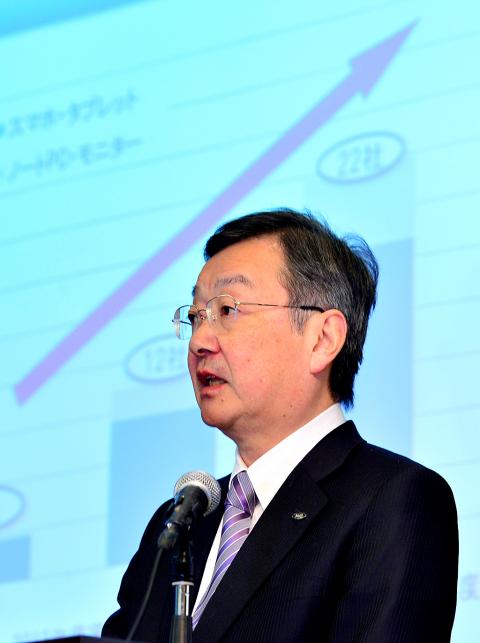Struggling Japanese electronics maker Sharp Corp said yesterday that it had swung back to profit for the full year to March after two years of huge losses, thanks to stronger sales and cost-cutting.
The Osaka-based company booked an ¥11.56 billion (US$113.38 million) net profit in the 12-month period, reversing an eye-watering net loss of ¥545.35 billion a year earlier.
Sales jumped 18.1 percent to ¥2.93 trillion on brisk demand for panels, including its popular “IGZO” displays for smartphones.

Photo: AFP
“We have produced unique devices and products while we have strengthened sales activities,” including 4K high-definition television sets, IGZO displays and solar cells, Sharp said in a statement.
“In addition, we implemented comprehensive operational improvement measures such as cutting inventory and curbing investment,” it said.
At the operating level, it also achieved a profit of ¥108.56 billion, compared with an operating loss of ¥146.27 billion the previous year.
Sharp has been undergoing a huge restructuring process to pare losses largely tied to its ailing electronics business.
That resulted in a ¥146.3 billion saving in reduced fixed costs and asset sales, while a ¥108.6 billion boost to sales contributed to the return to operating profit, it said.
Electronics appeared to have turned a corner in the year to March, with sales surging 17.9 percent on-year to ¥1.32 trillion.
Sales in digital information appliances — including televisions and smartphones — were almost flat at ¥733 billion, but sales of solar cells surged 68.9 percent to ¥439 billion, it said. For the current year to March next year, Sharp now forecasts ¥30 billion net profit and ¥100 billion operating profit on ¥3 trillion sales.
“We will make efforts to produce revolutionary products and solutions that will address the needs of our customers, seeking to move on to the ‘regrowth stage’ from the ‘restructuring stage,’” the company said.
Japanese electronics makers have struggled in recent years, largely because of huge losses in their television units, but a sharply weaker yen over the past year has helped to boost their bottom lines.
Sharp’s bigger rival Panasonic Corp said last month that it had booked its first annual net profit in three years and reversed a huge loss suffered in the previous 12 months as it presses on with a sweeping restructuring.
Panasonic said net profit hit ¥120.44 billion in its fiscal year to March, after suffering a loss of ¥754.25 billion a year earlier, while revenue ticked up to ¥7.74 trillion from ¥7.30 trillion.
Panasonic credited the weaker yen for its healthier results, and pointed to an uptick in its auto-related businesses on the back of a global recovery.
Sony, which earlier this month said it would report a bigger-than-expected annual loss due to costs tied to its exit from the personal computer business, is to release its earnings report tomorrow.

Intel Corp chief executive officer Lip-Bu Tan (陳立武) is expected to meet with Taiwanese suppliers next month in conjunction with the opening of the Computex Taipei trade show, supply chain sources said on Monday. The visit, the first for Tan to Taiwan since assuming his new post last month, would be aimed at enhancing Intel’s ties with suppliers in Taiwan as he attempts to help turn around the struggling US chipmaker, the sources said. Tan is to hold a banquet to celebrate Intel’s 40-year presence in Taiwan before Computex opens on May 20 and invite dozens of Taiwanese suppliers to exchange views

Application-specific integrated circuit designer Faraday Technology Corp (智原) yesterday said that although revenue this quarter would decline 30 percent from last quarter, it retained its full-year forecast of revenue growth of 100 percent. The company attributed the quarterly drop to a slowdown in customers’ production of chips using Faraday’s advanced packaging technology. The company is still confident about its revenue growth this year, given its strong “design-win” — or the projects it won to help customers design their chips, Faraday president Steve Wang (王國雍) told an online earnings conference. “The design-win this year is better than we expected. We believe we will win

Chizuko Kimura has become the first female sushi chef in the world to win a Michelin star, fulfilling a promise she made to her dying husband to continue his legacy. The 54-year-old Japanese chef regained the Michelin star her late husband, Shunei Kimura, won three years ago for their Sushi Shunei restaurant in Paris. For Shunei Kimura, the star was a dream come true. However, the joy was short-lived. He died from cancer just three months later in June 2022. He was 65. The following year, the restaurant in the heart of Montmartre lost its star rating. Chizuko Kimura insisted that the new star is still down

While China’s leaders use their economic and political might to fight US President Donald Trump’s trade war “to the end,” its army of social media soldiers are embarking on a more humorous campaign online. Trump’s tariff blitz has seen Washington and Beijing impose eye-watering duties on imports from the other, fanning a standoff between the economic superpowers that has sparked global recession fears and sent markets into a tailspin. Trump says his policy is a response to years of being “ripped off” by other countries and aims to bring manufacturing to the US, forcing companies to employ US workers. However, China’s online warriors